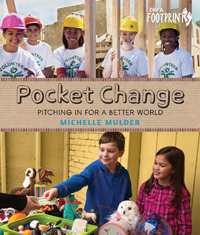| ________________
CM . . .
. Volume XXIII Number 24. . . .March 3, 2017

 |
Pocket Change: Pitching in For a Better World. (Orca Footprints).
Michelle Mulder.
Victoria, BC: Orca, 2016.
48 pp., hc., pdf & epub, $19.95 (pbk.).
ISBN 978-1-4598-0966-6 (pbk.), ISBN 978-1-4598-0967-3 (pdf), ISBN 978-1-4598-0968-0 (epub).
Subject Headings:
Consumption (Economics)-Environmental aspects-Juvenile literature.
Consumption (Economics)-Social aspects-Juvenile literature.
Grades 6-8 / Ages 11-13.
Review by Sophia Hunter.
**** /4
|
| |
|

excerpt:
Work? Nah…
Making everything by hand, like our ancestors did, took a lot of time. It’s easy to imagine families hundreds of years ago working far harder than we do today. But did you know that people in North America now work more hours than ever before? Historians say that until the late 1700s, most people worked just a few hours each day.
Pocket Change: Pitching in For a Better World is part of the “Orca Footprints” series. These books look at environmental issues from both a local and global perspective and in an age-appropriate manner. Although it is not clear from the title, this book is about consumerism. What is it? How did it develop? Why should we be concerned? And finally, what are some alternatives?
Michelle Mulder does an excellent job introducing young readers to complex ideas like the rise of currency, the transition to cities and factory work, and the gradual rise of consumerism. Within these explanations, Mulder emphasizes that most people wanted to work less and spend more time with family and friends. Factories started to pay workers less so they had to work more. Advertisers worked with companies to promote new changing fashions. The result was people wanted the newest colour for spring or the most fashionable carpet and were willing to work longer hours for it. As Mulder points out, the average North American started spending less time with family and friends and replaced these loved ones with loved things.
The central argument, without being too preachy, is that this has not been good for our happiness or for our planet. Factories pumped chemicals into our water and pollution into our air. As people bought new things, the old ones filled up landfills. This is where Mulder makes her connection between money and sustainability. Our purchasing power is destroying our environment.
Ready for the challenge that it is too late to change now, or people need to work to buy food, Mulder outlines a variety of alternatives. She provides concrete examples of groups of people who have organized to trade services. Time banks allow people to offer a service or an hour and then redeem it for an hour of something they need. Goods can be traded too. Eggs can be exchanged for fruit. Sharing of items is another recommendation. She references examples like car sharing services, although I think this section could have been better developed. She does make the clear argument that this services mean that more people have access to a car but only one car is purchased.
Overall, Pocket Change: Pitching in For a Better World is an excellent book that should be in any library or classroom. It is a unique blend of historical change and contemporary challenges. Mulder aims to educate, not indoctrinate.
Highly Recommended.
Sophia Hunter is a teacher-librarian at Crofton House School in Vancouver, BC.

To comment
on this title or this review, send mail to cm@umanitoba.ca.
Copyright © the Manitoba Library Association. Reproduction for personal
use is permitted only if this copyright notice is maintained. Any
other reproduction is prohibited without permission.
Next Review | Table of Contents For This Issue - March 3, 2017
CM Home | Back Issues
| Search
| CM Archive
| Profiles Archive
|
